Health & Social Care: Report on Empowering Users of Services
VerifiedAdded on 2020/01/07
|26
|7010
|184
Report
AI Summary
This report comprehensively examines the empowerment of users within the health and social care (HSC) sector. It begins by exploring relevant legislation, including human rights and equity acts, and analyzes how factors like staffing, training, and communication impact the ability of domiciliary care organizations to maximize the rights of elderly users. The report then delves into the factors contributing to the loss of independence, non-participation, and social exclusion of vulnerable individuals, providing case studies to illustrate these concepts. Furthermore, it assesses risk management strategies within supported housing complexes and examines legislative policies and effective administration of medication for individuals with autism. The report emphasizes the importance of positive communication, person-centered care, and effective policies in promoting user rights and independence, offering valuable insights for healthcare professionals and students alike.
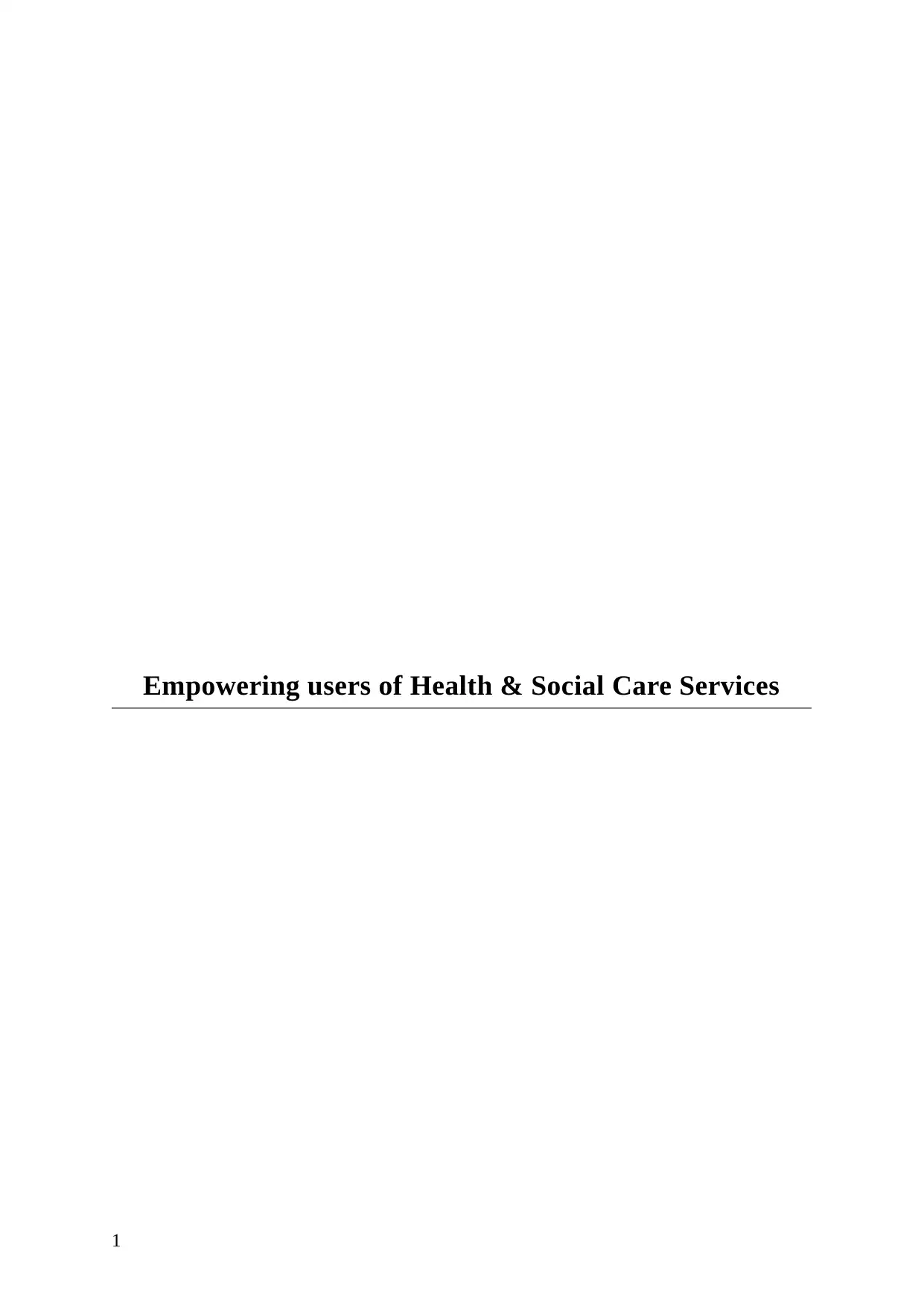
Empowering users of Health & Social Care Services
1
1
Paraphrase This Document
Need a fresh take? Get an instant paraphrase of this document with our AI Paraphraser
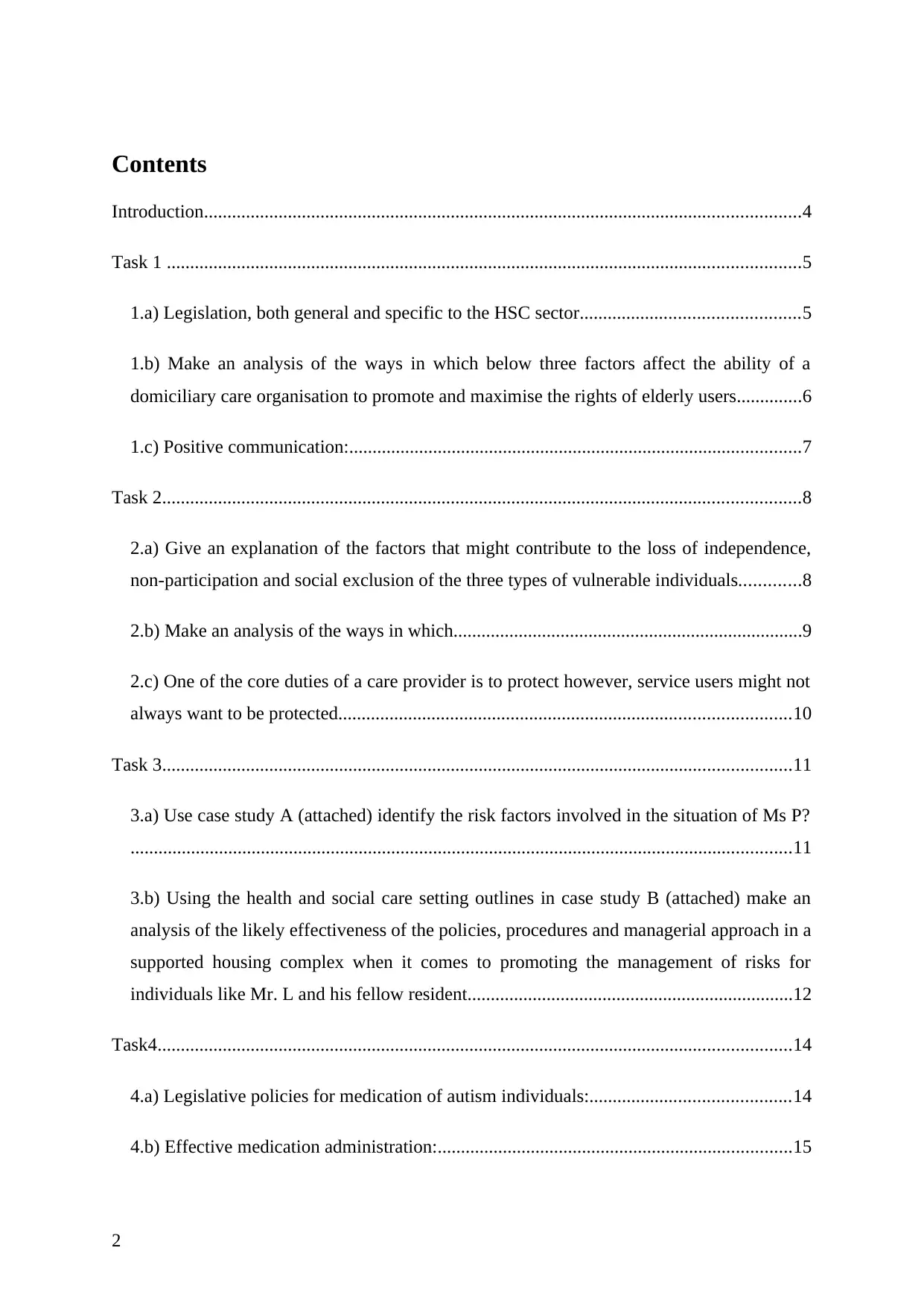
Contents
Introduction................................................................................................................................4
Task 1 ........................................................................................................................................5
1.a) Legislation, both general and specific to the HSC sector...............................................5
1.b) Make an analysis of the ways in which below three factors affect the ability of a
domiciliary care organisation to promote and maximise the rights of elderly users..............6
1.c) Positive communication:.................................................................................................7
Task 2.........................................................................................................................................8
2.a) Give an explanation of the factors that might contribute to the loss of independence,
non-participation and social exclusion of the three types of vulnerable individuals.............8
2.b) Make an analysis of the ways in which...........................................................................9
2.c) One of the core duties of a care provider is to protect however, service users might not
always want to be protected.................................................................................................10
Task 3.......................................................................................................................................11
3.a) Use case study A (attached) identify the risk factors involved in the situation of Ms P?
..............................................................................................................................................11
3.b) Using the health and social care setting outlines in case study B (attached) make an
analysis of the likely effectiveness of the policies, procedures and managerial approach in a
supported housing complex when it comes to promoting the management of risks for
individuals like Mr. L and his fellow resident......................................................................12
Task4........................................................................................................................................14
4.a) Legislative policies for medication of autism individuals:...........................................14
4.b) Effective medication administration:............................................................................15
2
Introduction................................................................................................................................4
Task 1 ........................................................................................................................................5
1.a) Legislation, both general and specific to the HSC sector...............................................5
1.b) Make an analysis of the ways in which below three factors affect the ability of a
domiciliary care organisation to promote and maximise the rights of elderly users..............6
1.c) Positive communication:.................................................................................................7
Task 2.........................................................................................................................................8
2.a) Give an explanation of the factors that might contribute to the loss of independence,
non-participation and social exclusion of the three types of vulnerable individuals.............8
2.b) Make an analysis of the ways in which...........................................................................9
2.c) One of the core duties of a care provider is to protect however, service users might not
always want to be protected.................................................................................................10
Task 3.......................................................................................................................................11
3.a) Use case study A (attached) identify the risk factors involved in the situation of Ms P?
..............................................................................................................................................11
3.b) Using the health and social care setting outlines in case study B (attached) make an
analysis of the likely effectiveness of the policies, procedures and managerial approach in a
supported housing complex when it comes to promoting the management of risks for
individuals like Mr. L and his fellow resident......................................................................12
Task4........................................................................................................................................14
4.a) Legislative policies for medication of autism individuals:...........................................14
4.b) Effective medication administration:............................................................................15
2
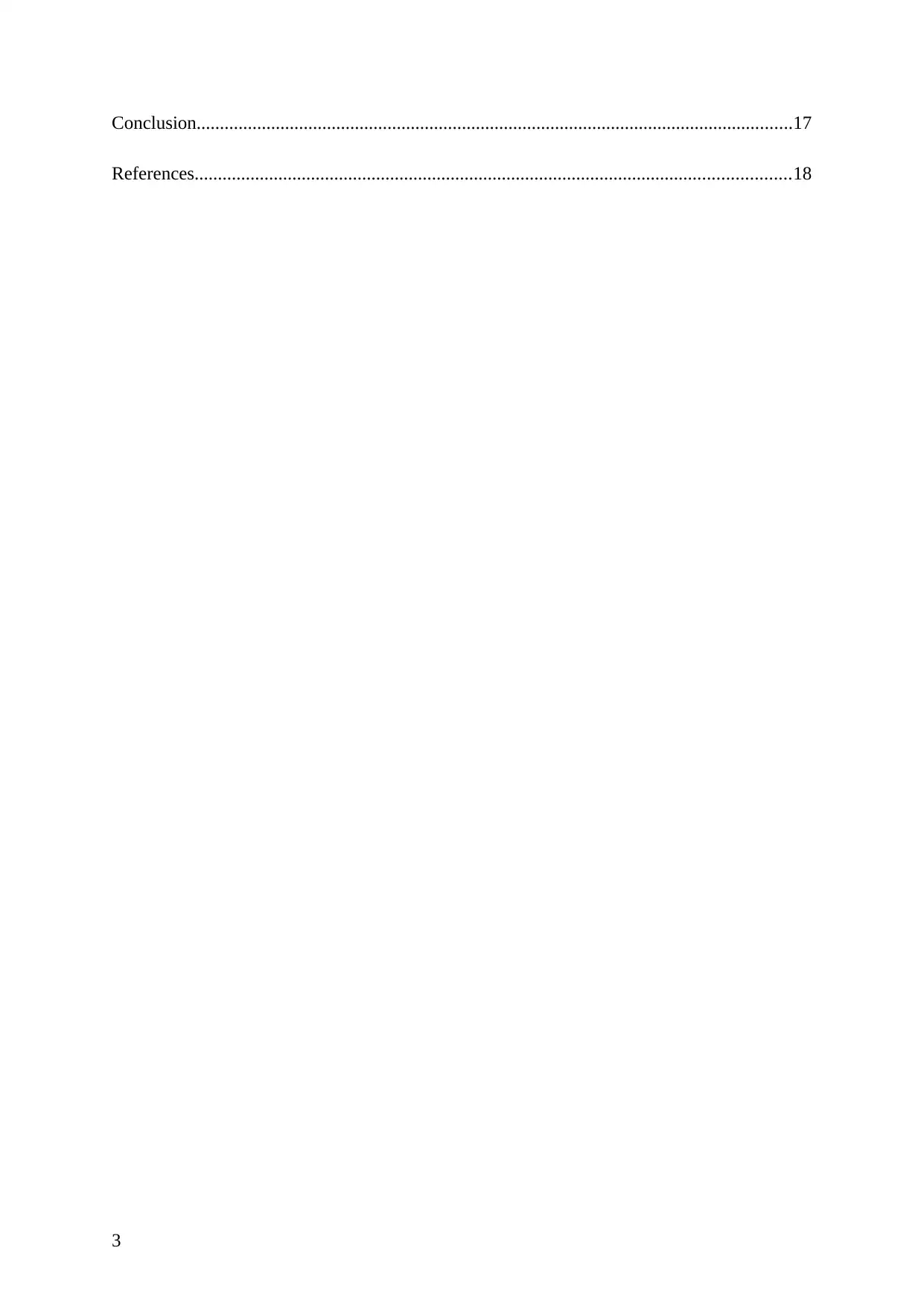
Conclusion................................................................................................................................17
References................................................................................................................................18
3
References................................................................................................................................18
3
⊘ This is a preview!⊘
Do you want full access?
Subscribe today to unlock all pages.

Trusted by 1+ million students worldwide
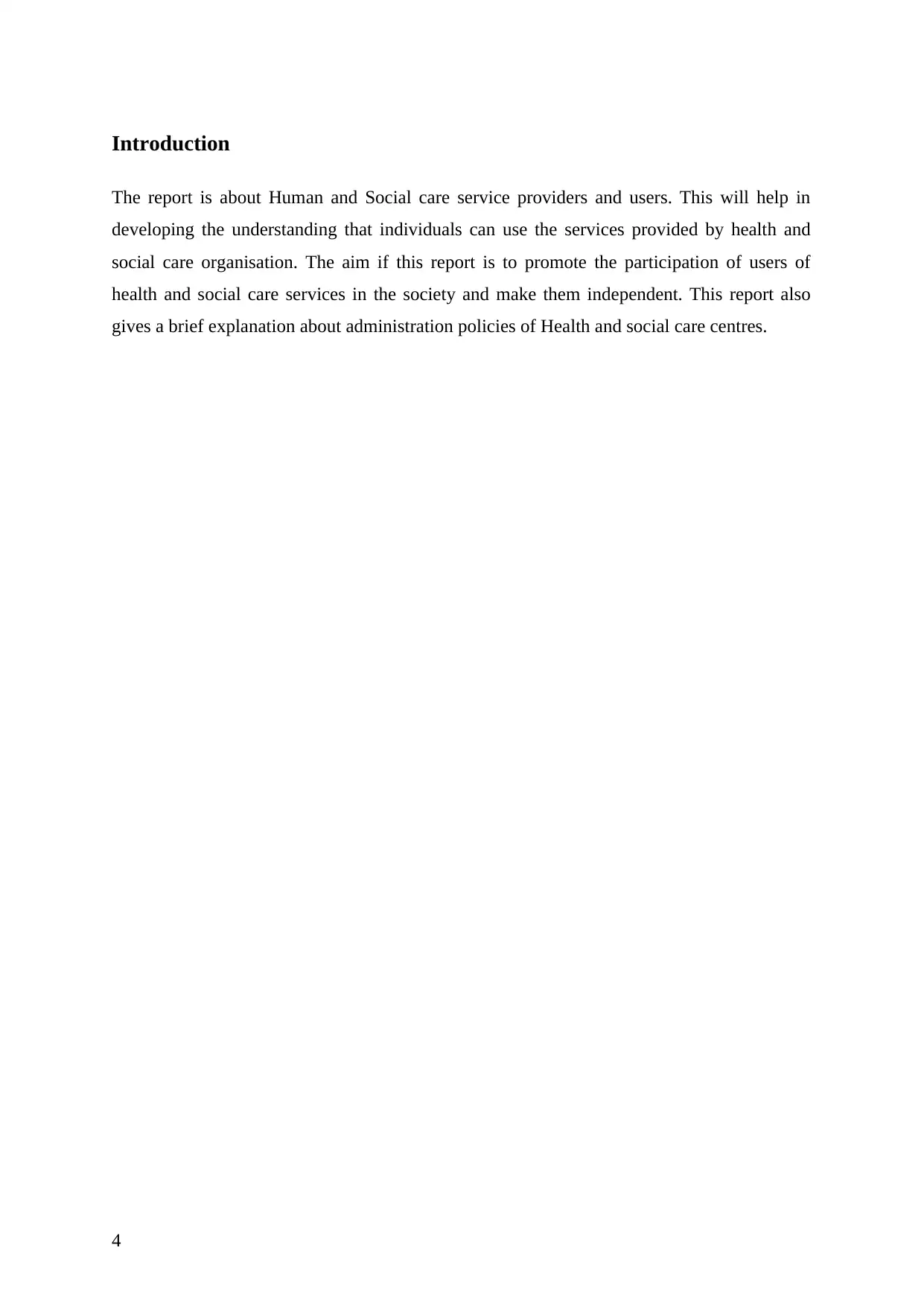
Introduction
The report is about Human and Social care service providers and users. This will help in
developing the understanding that individuals can use the services provided by health and
social care organisation. The aim if this report is to promote the participation of users of
health and social care services in the society and make them independent. This report also
gives a brief explanation about administration policies of Health and social care centres.
4
The report is about Human and Social care service providers and users. This will help in
developing the understanding that individuals can use the services provided by health and
social care organisation. The aim if this report is to promote the participation of users of
health and social care services in the society and make them independent. This report also
gives a brief explanation about administration policies of Health and social care centres.
4
Paraphrase This Document
Need a fresh take? Get an instant paraphrase of this document with our AI Paraphraser
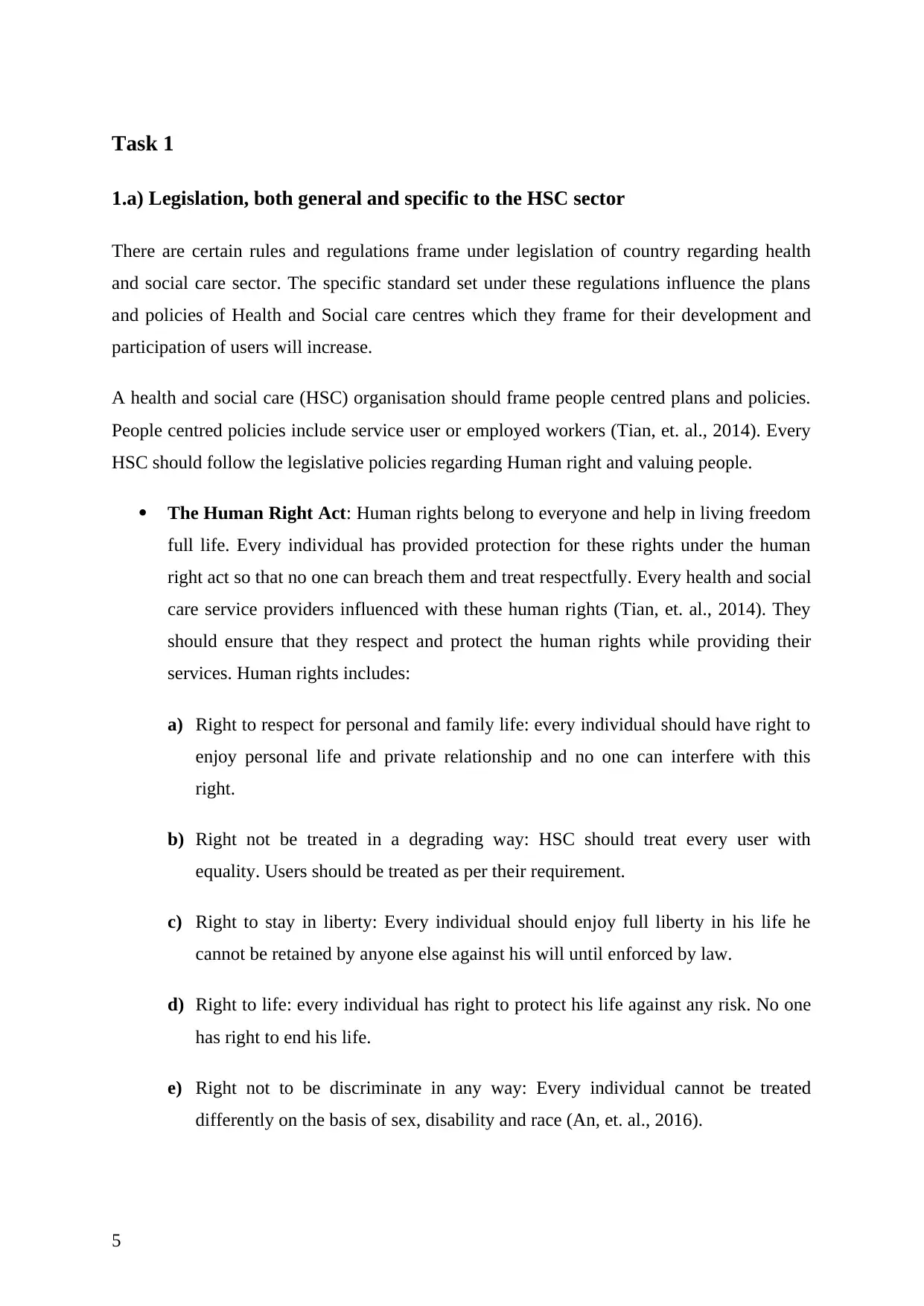
Task 1
1.a) Legislation, both general and specific to the HSC sector
There are certain rules and regulations frame under legislation of country regarding health
and social care sector. The specific standard set under these regulations influence the plans
and policies of Health and Social care centres which they frame for their development and
participation of users will increase.
A health and social care (HSC) organisation should frame people centred plans and policies.
People centred policies include service user or employed workers (Tian, et. al., 2014). Every
HSC should follow the legislative policies regarding Human right and valuing people.
The Human Right Act: Human rights belong to everyone and help in living freedom
full life. Every individual has provided protection for these rights under the human
right act so that no one can breach them and treat respectfully. Every health and social
care service providers influenced with these human rights (Tian, et. al., 2014). They
should ensure that they respect and protect the human rights while providing their
services. Human rights includes:
a) Right to respect for personal and family life: every individual should have right to
enjoy personal life and private relationship and no one can interfere with this
right.
b) Right not be treated in a degrading way: HSC should treat every user with
equality. Users should be treated as per their requirement.
c) Right to stay in liberty: Every individual should enjoy full liberty in his life he
cannot be retained by anyone else against his will until enforced by law.
d) Right to life: every individual has right to protect his life against any risk. No one
has right to end his life.
e) Right not to be discriminate in any way: Every individual cannot be treated
differently on the basis of sex, disability and race (An, et. al., 2016).
5
1.a) Legislation, both general and specific to the HSC sector
There are certain rules and regulations frame under legislation of country regarding health
and social care sector. The specific standard set under these regulations influence the plans
and policies of Health and Social care centres which they frame for their development and
participation of users will increase.
A health and social care (HSC) organisation should frame people centred plans and policies.
People centred policies include service user or employed workers (Tian, et. al., 2014). Every
HSC should follow the legislative policies regarding Human right and valuing people.
The Human Right Act: Human rights belong to everyone and help in living freedom
full life. Every individual has provided protection for these rights under the human
right act so that no one can breach them and treat respectfully. Every health and social
care service providers influenced with these human rights (Tian, et. al., 2014). They
should ensure that they respect and protect the human rights while providing their
services. Human rights includes:
a) Right to respect for personal and family life: every individual should have right to
enjoy personal life and private relationship and no one can interfere with this
right.
b) Right not be treated in a degrading way: HSC should treat every user with
equality. Users should be treated as per their requirement.
c) Right to stay in liberty: Every individual should enjoy full liberty in his life he
cannot be retained by anyone else against his will until enforced by law.
d) Right to life: every individual has right to protect his life against any risk. No one
has right to end his life.
e) Right not to be discriminate in any way: Every individual cannot be treated
differently on the basis of sex, disability and race (An, et. al., 2016).
5
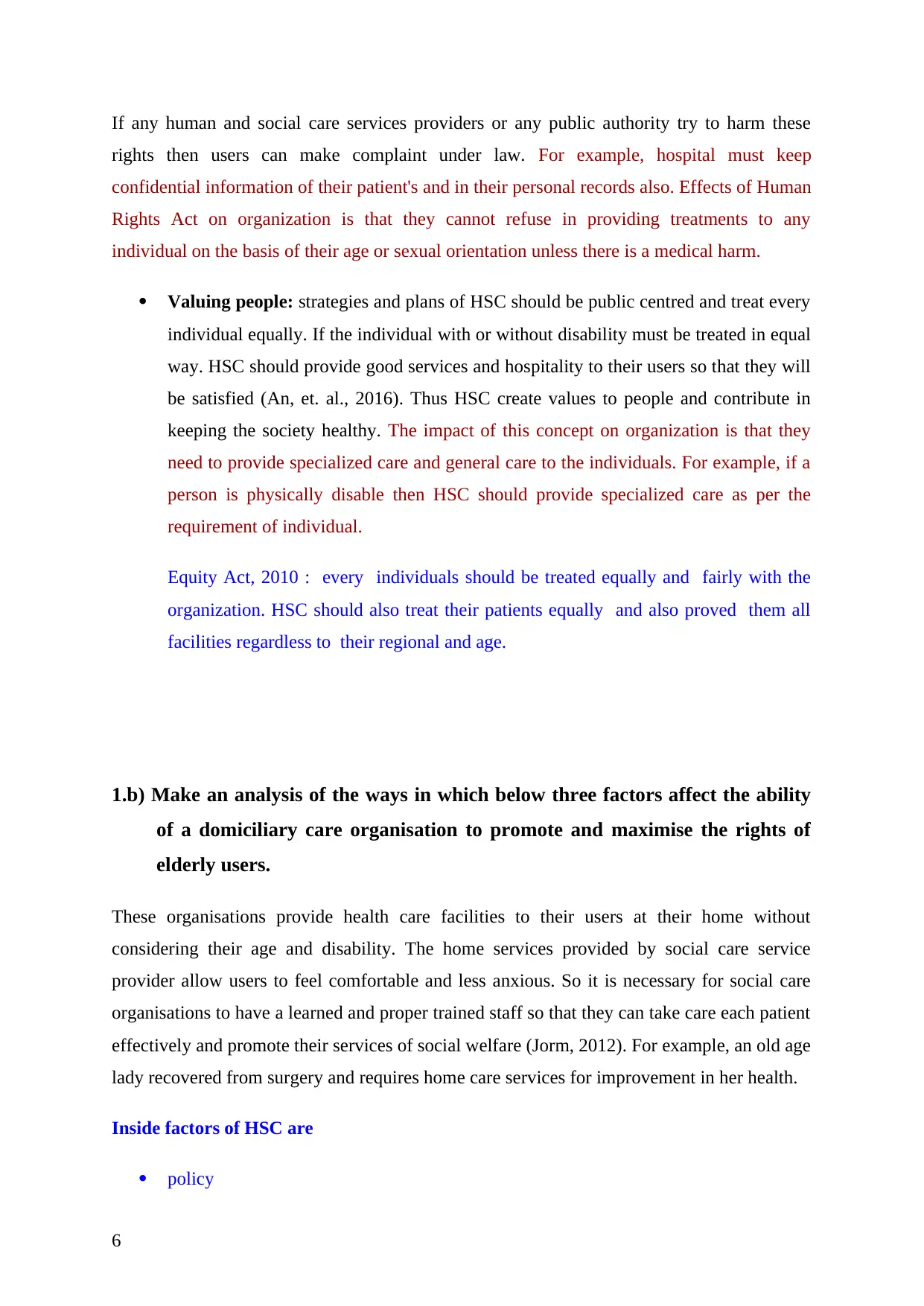
If any human and social care services providers or any public authority try to harm these
rights then users can make complaint under law. For example, hospital must keep
confidential information of their patient's and in their personal records also. Effects of Human
Rights Act on organization is that they cannot refuse in providing treatments to any
individual on the basis of their age or sexual orientation unless there is a medical harm.
Valuing people: strategies and plans of HSC should be public centred and treat every
individual equally. If the individual with or without disability must be treated in equal
way. HSC should provide good services and hospitality to their users so that they will
be satisfied (An, et. al., 2016). Thus HSC create values to people and contribute in
keeping the society healthy. The impact of this concept on organization is that they
need to provide specialized care and general care to the individuals. For example, if a
person is physically disable then HSC should provide specialized care as per the
requirement of individual.
Equity Act, 2010 : every individuals should be treated equally and fairly with the
organization. HSC should also treat their patients equally and also proved them all
facilities regardless to their regional and age.
1.b) Make an analysis of the ways in which below three factors affect the ability
of a domiciliary care organisation to promote and maximise the rights of
elderly users.
These organisations provide health care facilities to their users at their home without
considering their age and disability. The home services provided by social care service
provider allow users to feel comfortable and less anxious. So it is necessary for social care
organisations to have a learned and proper trained staff so that they can take care each patient
effectively and promote their services of social welfare (Jorm, 2012). For example, an old age
lady recovered from surgery and requires home care services for improvement in her health.
Inside factors of HSC are
policy
6
rights then users can make complaint under law. For example, hospital must keep
confidential information of their patient's and in their personal records also. Effects of Human
Rights Act on organization is that they cannot refuse in providing treatments to any
individual on the basis of their age or sexual orientation unless there is a medical harm.
Valuing people: strategies and plans of HSC should be public centred and treat every
individual equally. If the individual with or without disability must be treated in equal
way. HSC should provide good services and hospitality to their users so that they will
be satisfied (An, et. al., 2016). Thus HSC create values to people and contribute in
keeping the society healthy. The impact of this concept on organization is that they
need to provide specialized care and general care to the individuals. For example, if a
person is physically disable then HSC should provide specialized care as per the
requirement of individual.
Equity Act, 2010 : every individuals should be treated equally and fairly with the
organization. HSC should also treat their patients equally and also proved them all
facilities regardless to their regional and age.
1.b) Make an analysis of the ways in which below three factors affect the ability
of a domiciliary care organisation to promote and maximise the rights of
elderly users.
These organisations provide health care facilities to their users at their home without
considering their age and disability. The home services provided by social care service
provider allow users to feel comfortable and less anxious. So it is necessary for social care
organisations to have a learned and proper trained staff so that they can take care each patient
effectively and promote their services of social welfare (Jorm, 2012). For example, an old age
lady recovered from surgery and requires home care services for improvement in her health.
Inside factors of HSC are
policy
6
⊘ This is a preview!⊘
Do you want full access?
Subscribe today to unlock all pages.

Trusted by 1+ million students worldwide
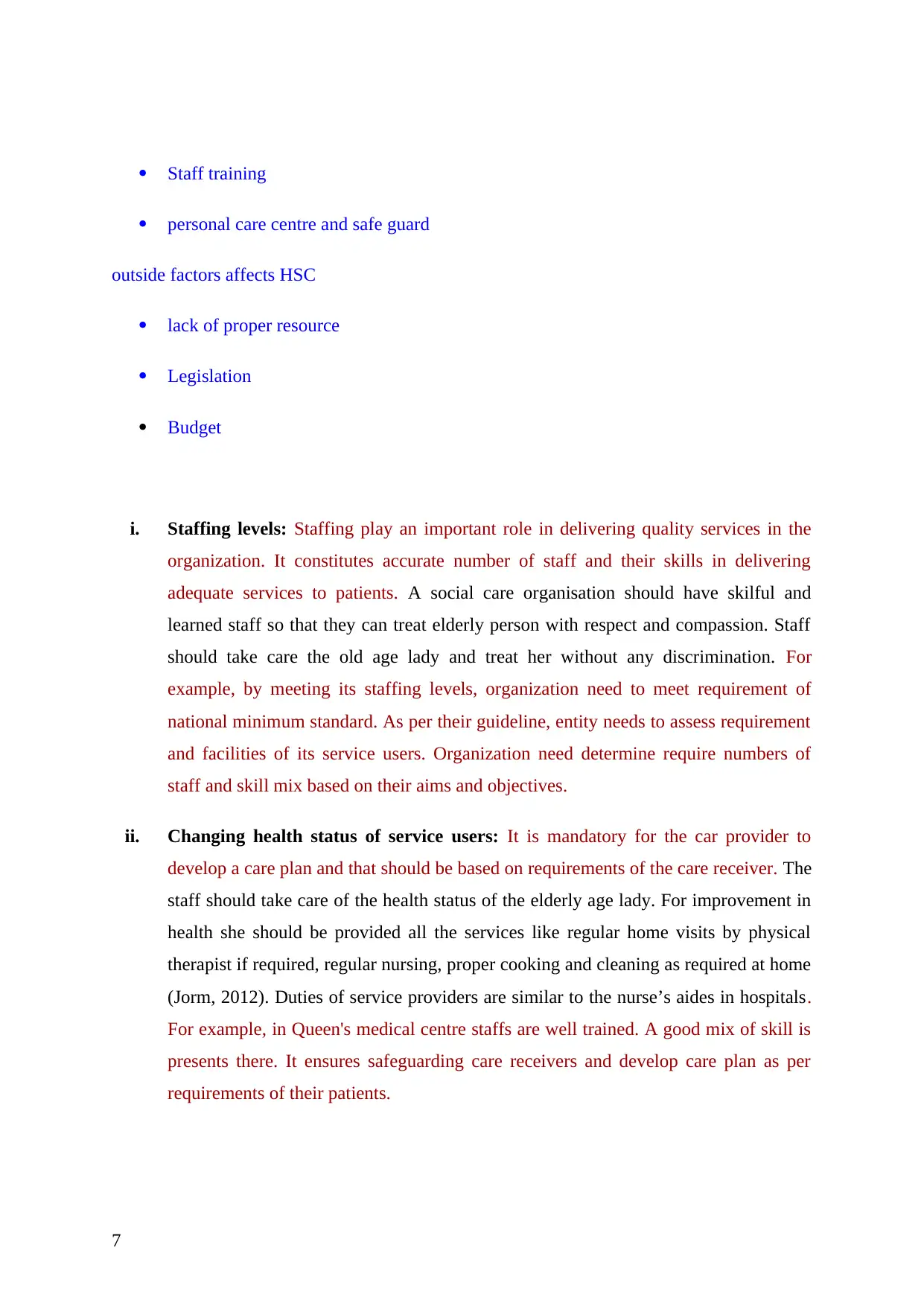
Staff training
personal care centre and safe guard
outside factors affects HSC
lack of proper resource
Legislation
Budget
i. Staffing levels: Staffing play an important role in delivering quality services in the
organization. It constitutes accurate number of staff and their skills in delivering
adequate services to patients. A social care organisation should have skilful and
learned staff so that they can treat elderly person with respect and compassion. Staff
should take care the old age lady and treat her without any discrimination. For
example, by meeting its staffing levels, organization need to meet requirement of
national minimum standard. As per their guideline, entity needs to assess requirement
and facilities of its service users. Organization need determine require numbers of
staff and skill mix based on their aims and objectives.
ii. Changing health status of service users: It is mandatory for the car provider to
develop a care plan and that should be based on requirements of the care receiver. The
staff should take care of the health status of the elderly age lady. For improvement in
health she should be provided all the services like regular home visits by physical
therapist if required, regular nursing, proper cooking and cleaning as required at home
(Jorm, 2012). Duties of service providers are similar to the nurse’s aides in hospitals.
For example, in Queen's medical centre staffs are well trained. A good mix of skill is
presents there. It ensures safeguarding care receivers and develop care plan as per
requirements of their patients.
7
personal care centre and safe guard
outside factors affects HSC
lack of proper resource
Legislation
Budget
i. Staffing levels: Staffing play an important role in delivering quality services in the
organization. It constitutes accurate number of staff and their skills in delivering
adequate services to patients. A social care organisation should have skilful and
learned staff so that they can treat elderly person with respect and compassion. Staff
should take care the old age lady and treat her without any discrimination. For
example, by meeting its staffing levels, organization need to meet requirement of
national minimum standard. As per their guideline, entity needs to assess requirement
and facilities of its service users. Organization need determine require numbers of
staff and skill mix based on their aims and objectives.
ii. Changing health status of service users: It is mandatory for the car provider to
develop a care plan and that should be based on requirements of the care receiver. The
staff should take care of the health status of the elderly age lady. For improvement in
health she should be provided all the services like regular home visits by physical
therapist if required, regular nursing, proper cooking and cleaning as required at home
(Jorm, 2012). Duties of service providers are similar to the nurse’s aides in hospitals.
For example, in Queen's medical centre staffs are well trained. A good mix of skill is
presents there. It ensures safeguarding care receivers and develop care plan as per
requirements of their patients.
7
Paraphrase This Document
Need a fresh take? Get an instant paraphrase of this document with our AI Paraphraser
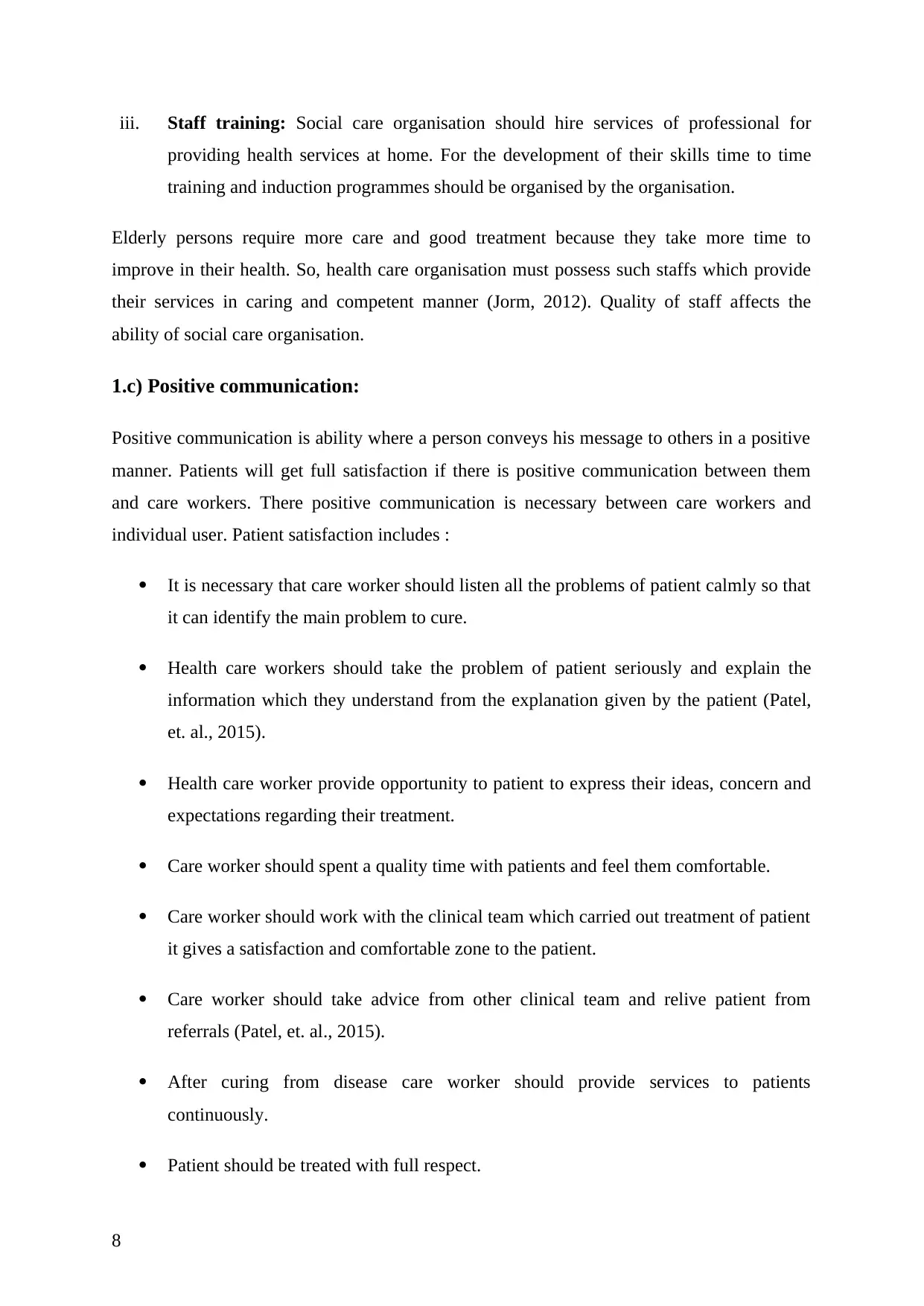
iii. Staff training: Social care organisation should hire services of professional for
providing health services at home. For the development of their skills time to time
training and induction programmes should be organised by the organisation.
Elderly persons require more care and good treatment because they take more time to
improve in their health. So, health care organisation must possess such staffs which provide
their services in caring and competent manner (Jorm, 2012). Quality of staff affects the
ability of social care organisation.
1.c) Positive communication:
Positive communication is ability where a person conveys his message to others in a positive
manner. Patients will get full satisfaction if there is positive communication between them
and care workers. There positive communication is necessary between care workers and
individual user. Patient satisfaction includes :
It is necessary that care worker should listen all the problems of patient calmly so that
it can identify the main problem to cure.
Health care workers should take the problem of patient seriously and explain the
information which they understand from the explanation given by the patient (Patel,
et. al., 2015).
Health care worker provide opportunity to patient to express their ideas, concern and
expectations regarding their treatment.
Care worker should spent a quality time with patients and feel them comfortable.
Care worker should work with the clinical team which carried out treatment of patient
it gives a satisfaction and comfortable zone to the patient.
Care worker should take advice from other clinical team and relive patient from
referrals (Patel, et. al., 2015).
After curing from disease care worker should provide services to patients
continuously.
Patient should be treated with full respect.
8
providing health services at home. For the development of their skills time to time
training and induction programmes should be organised by the organisation.
Elderly persons require more care and good treatment because they take more time to
improve in their health. So, health care organisation must possess such staffs which provide
their services in caring and competent manner (Jorm, 2012). Quality of staff affects the
ability of social care organisation.
1.c) Positive communication:
Positive communication is ability where a person conveys his message to others in a positive
manner. Patients will get full satisfaction if there is positive communication between them
and care workers. There positive communication is necessary between care workers and
individual user. Patient satisfaction includes :
It is necessary that care worker should listen all the problems of patient calmly so that
it can identify the main problem to cure.
Health care workers should take the problem of patient seriously and explain the
information which they understand from the explanation given by the patient (Patel,
et. al., 2015).
Health care worker provide opportunity to patient to express their ideas, concern and
expectations regarding their treatment.
Care worker should spent a quality time with patients and feel them comfortable.
Care worker should work with the clinical team which carried out treatment of patient
it gives a satisfaction and comfortable zone to the patient.
Care worker should take advice from other clinical team and relive patient from
referrals (Patel, et. al., 2015).
After curing from disease care worker should provide services to patients
continuously.
Patient should be treated with full respect.
8
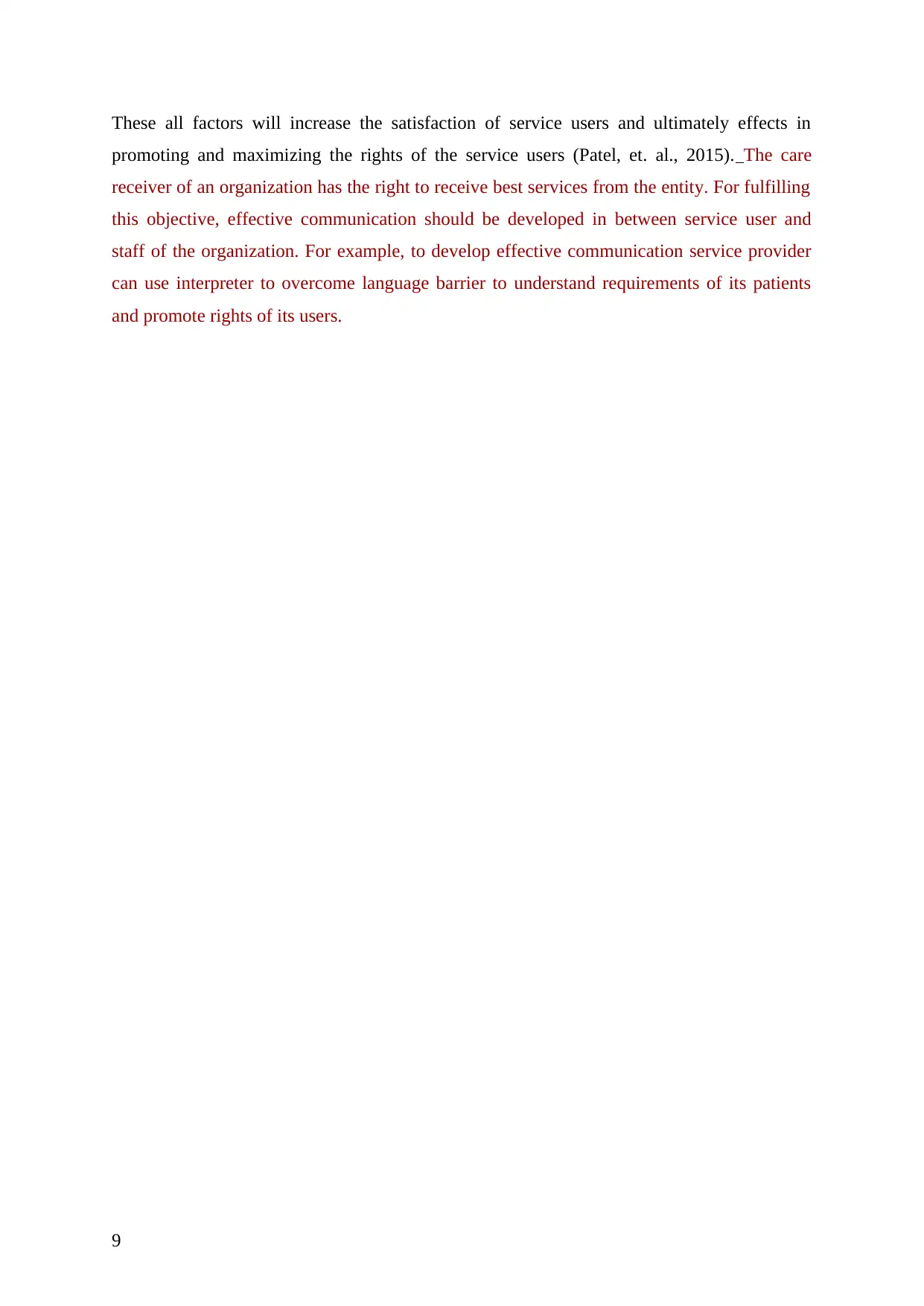
These all factors will increase the satisfaction of service users and ultimately effects in
promoting and maximizing the rights of the service users (Patel, et. al., 2015). The care
receiver of an organization has the right to receive best services from the entity. For fulfilling
this objective, effective communication should be developed in between service user and
staff of the organization. For example, to develop effective communication service provider
can use interpreter to overcome language barrier to understand requirements of its patients
and promote rights of its users.
9
promoting and maximizing the rights of the service users (Patel, et. al., 2015). The care
receiver of an organization has the right to receive best services from the entity. For fulfilling
this objective, effective communication should be developed in between service user and
staff of the organization. For example, to develop effective communication service provider
can use interpreter to overcome language barrier to understand requirements of its patients
and promote rights of its users.
9
⊘ This is a preview!⊘
Do you want full access?
Subscribe today to unlock all pages.

Trusted by 1+ million students worldwide
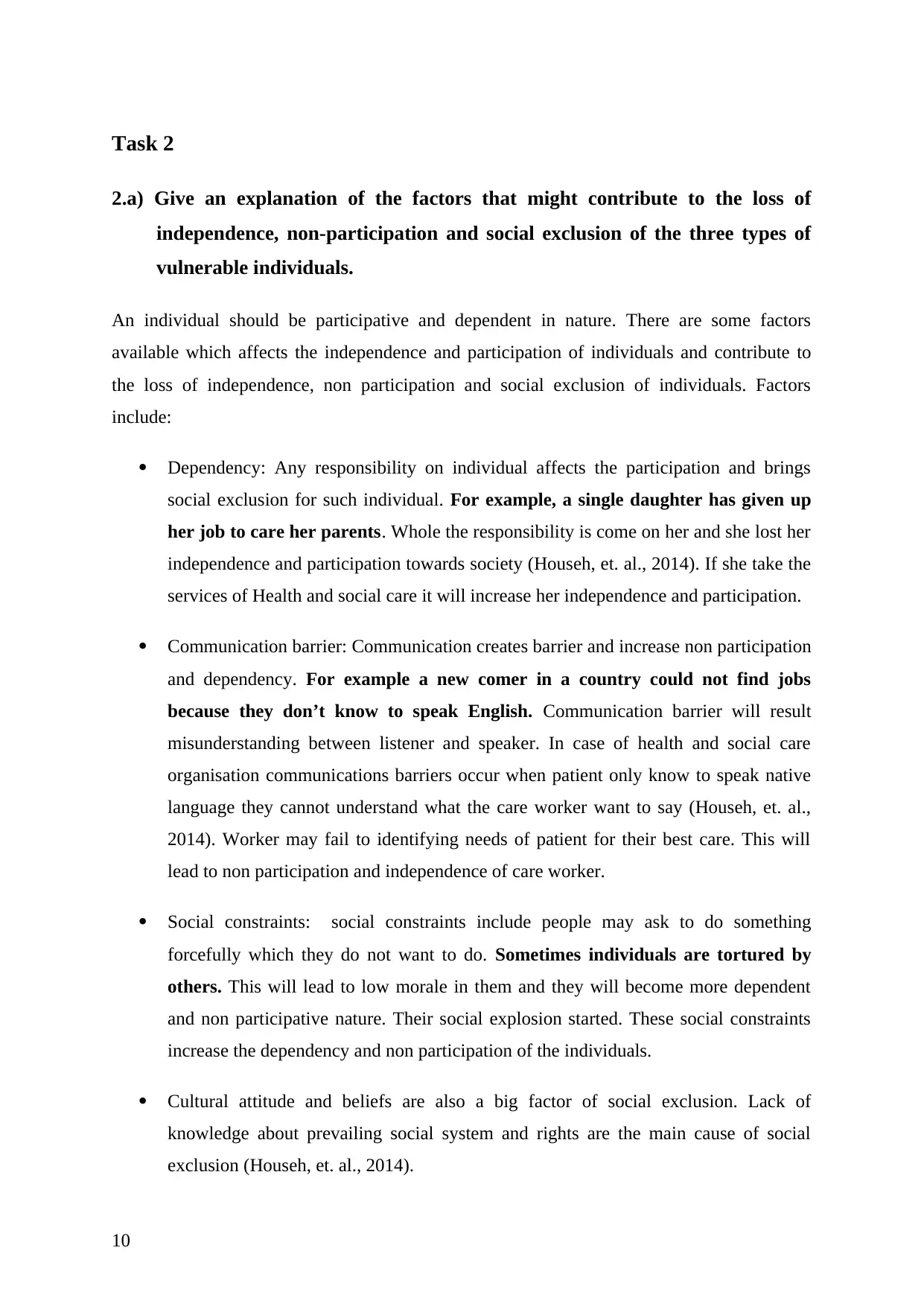
Task 2
2.a) Give an explanation of the factors that might contribute to the loss of
independence, non-participation and social exclusion of the three types of
vulnerable individuals.
An individual should be participative and dependent in nature. There are some factors
available which affects the independence and participation of individuals and contribute to
the loss of independence, non participation and social exclusion of individuals. Factors
include:
Dependency: Any responsibility on individual affects the participation and brings
social exclusion for such individual. For example, a single daughter has given up
her job to care her parents. Whole the responsibility is come on her and she lost her
independence and participation towards society (Househ, et. al., 2014). If she take the
services of Health and social care it will increase her independence and participation.
Communication barrier: Communication creates barrier and increase non participation
and dependency. For example a new comer in a country could not find jobs
because they don’t know to speak English. Communication barrier will result
misunderstanding between listener and speaker. In case of health and social care
organisation communications barriers occur when patient only know to speak native
language they cannot understand what the care worker want to say (Househ, et. al.,
2014). Worker may fail to identifying needs of patient for their best care. This will
lead to non participation and independence of care worker.
Social constraints: social constraints include people may ask to do something
forcefully which they do not want to do. Sometimes individuals are tortured by
others. This will lead to low morale in them and they will become more dependent
and non participative nature. Their social explosion started. These social constraints
increase the dependency and non participation of the individuals.
Cultural attitude and beliefs are also a big factor of social exclusion. Lack of
knowledge about prevailing social system and rights are the main cause of social
exclusion (Househ, et. al., 2014).
10
2.a) Give an explanation of the factors that might contribute to the loss of
independence, non-participation and social exclusion of the three types of
vulnerable individuals.
An individual should be participative and dependent in nature. There are some factors
available which affects the independence and participation of individuals and contribute to
the loss of independence, non participation and social exclusion of individuals. Factors
include:
Dependency: Any responsibility on individual affects the participation and brings
social exclusion for such individual. For example, a single daughter has given up
her job to care her parents. Whole the responsibility is come on her and she lost her
independence and participation towards society (Househ, et. al., 2014). If she take the
services of Health and social care it will increase her independence and participation.
Communication barrier: Communication creates barrier and increase non participation
and dependency. For example a new comer in a country could not find jobs
because they don’t know to speak English. Communication barrier will result
misunderstanding between listener and speaker. In case of health and social care
organisation communications barriers occur when patient only know to speak native
language they cannot understand what the care worker want to say (Househ, et. al.,
2014). Worker may fail to identifying needs of patient for their best care. This will
lead to non participation and independence of care worker.
Social constraints: social constraints include people may ask to do something
forcefully which they do not want to do. Sometimes individuals are tortured by
others. This will lead to low morale in them and they will become more dependent
and non participative nature. Their social explosion started. These social constraints
increase the dependency and non participation of the individuals.
Cultural attitude and beliefs are also a big factor of social exclusion. Lack of
knowledge about prevailing social system and rights are the main cause of social
exclusion (Househ, et. al., 2014).
10
Paraphrase This Document
Need a fresh take? Get an instant paraphrase of this document with our AI Paraphraser
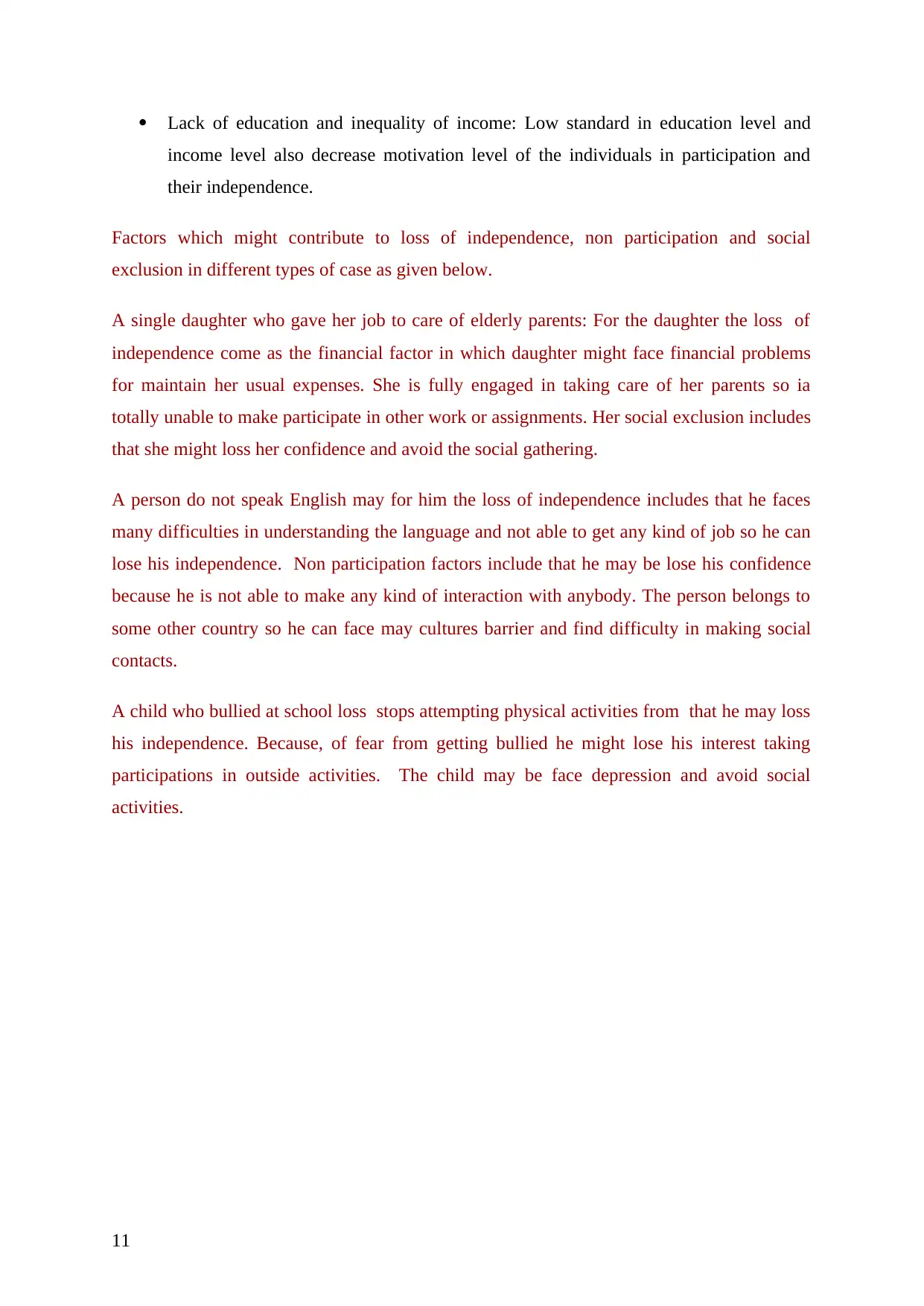
Lack of education and inequality of income: Low standard in education level and
income level also decrease motivation level of the individuals in participation and
their independence.
Factors which might contribute to loss of independence, non participation and social
exclusion in different types of case as given below.
A single daughter who gave her job to care of elderly parents: For the daughter the loss of
independence come as the financial factor in which daughter might face financial problems
for maintain her usual expenses. She is fully engaged in taking care of her parents so ia
totally unable to make participate in other work or assignments. Her social exclusion includes
that she might loss her confidence and avoid the social gathering.
A person do not speak English may for him the loss of independence includes that he faces
many difficulties in understanding the language and not able to get any kind of job so he can
lose his independence. Non participation factors include that he may be lose his confidence
because he is not able to make any kind of interaction with anybody. The person belongs to
some other country so he can face may cultures barrier and find difficulty in making social
contacts.
A child who bullied at school loss stops attempting physical activities from that he may loss
his independence. Because, of fear from getting bullied he might lose his interest taking
participations in outside activities. The child may be face depression and avoid social
activities.
11
income level also decrease motivation level of the individuals in participation and
their independence.
Factors which might contribute to loss of independence, non participation and social
exclusion in different types of case as given below.
A single daughter who gave her job to care of elderly parents: For the daughter the loss of
independence come as the financial factor in which daughter might face financial problems
for maintain her usual expenses. She is fully engaged in taking care of her parents so ia
totally unable to make participate in other work or assignments. Her social exclusion includes
that she might loss her confidence and avoid the social gathering.
A person do not speak English may for him the loss of independence includes that he faces
many difficulties in understanding the language and not able to get any kind of job so he can
lose his independence. Non participation factors include that he may be lose his confidence
because he is not able to make any kind of interaction with anybody. The person belongs to
some other country so he can face may cultures barrier and find difficulty in making social
contacts.
A child who bullied at school loss stops attempting physical activities from that he may loss
his independence. Because, of fear from getting bullied he might lose his interest taking
participations in outside activities. The child may be face depression and avoid social
activities.
11
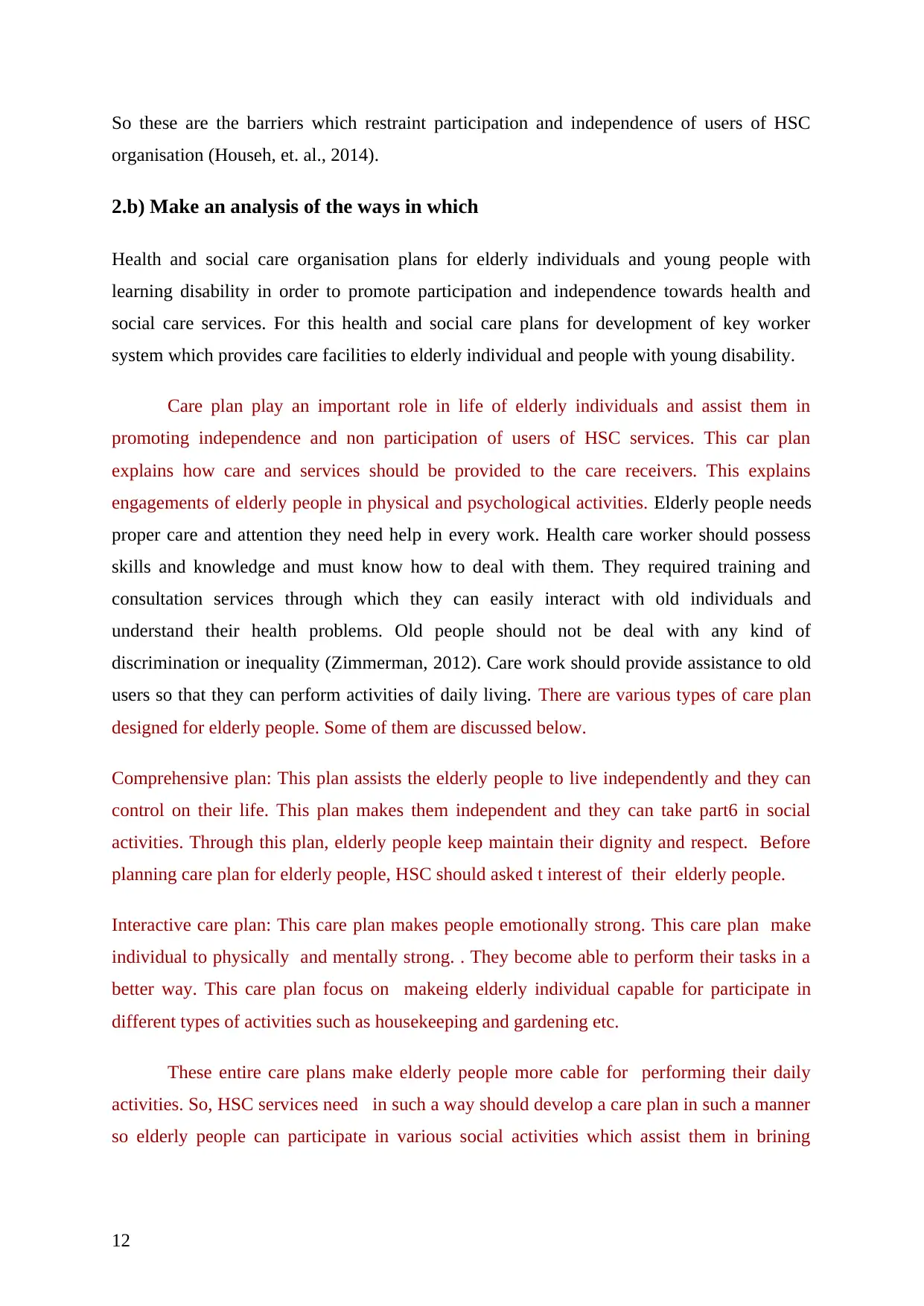
So these are the barriers which restraint participation and independence of users of HSC
organisation (Househ, et. al., 2014).
2.b) Make an analysis of the ways in which
Health and social care organisation plans for elderly individuals and young people with
learning disability in order to promote participation and independence towards health and
social care services. For this health and social care plans for development of key worker
system which provides care facilities to elderly individual and people with young disability.
Care plan play an important role in life of elderly individuals and assist them in
promoting independence and non participation of users of HSC services. This car plan
explains how care and services should be provided to the care receivers. This explains
engagements of elderly people in physical and psychological activities. Elderly people needs
proper care and attention they need help in every work. Health care worker should possess
skills and knowledge and must know how to deal with them. They required training and
consultation services through which they can easily interact with old individuals and
understand their health problems. Old people should not be deal with any kind of
discrimination or inequality (Zimmerman, 2012). Care work should provide assistance to old
users so that they can perform activities of daily living. There are various types of care plan
designed for elderly people. Some of them are discussed below.
Comprehensive plan: This plan assists the elderly people to live independently and they can
control on their life. This plan makes them independent and they can take part6 in social
activities. Through this plan, elderly people keep maintain their dignity and respect. Before
planning care plan for elderly people, HSC should asked t interest of their elderly people.
Interactive care plan: This care plan makes people emotionally strong. This care plan make
individual to physically and mentally strong. . They become able to perform their tasks in a
better way. This care plan focus on makeing elderly individual capable for participate in
different types of activities such as housekeeping and gardening etc.
These entire care plans make elderly people more cable for performing their daily
activities. So, HSC services need in such a way should develop a care plan in such a manner
so elderly people can participate in various social activities which assist them in brining
12
organisation (Househ, et. al., 2014).
2.b) Make an analysis of the ways in which
Health and social care organisation plans for elderly individuals and young people with
learning disability in order to promote participation and independence towards health and
social care services. For this health and social care plans for development of key worker
system which provides care facilities to elderly individual and people with young disability.
Care plan play an important role in life of elderly individuals and assist them in
promoting independence and non participation of users of HSC services. This car plan
explains how care and services should be provided to the care receivers. This explains
engagements of elderly people in physical and psychological activities. Elderly people needs
proper care and attention they need help in every work. Health care worker should possess
skills and knowledge and must know how to deal with them. They required training and
consultation services through which they can easily interact with old individuals and
understand their health problems. Old people should not be deal with any kind of
discrimination or inequality (Zimmerman, 2012). Care work should provide assistance to old
users so that they can perform activities of daily living. There are various types of care plan
designed for elderly people. Some of them are discussed below.
Comprehensive plan: This plan assists the elderly people to live independently and they can
control on their life. This plan makes them independent and they can take part6 in social
activities. Through this plan, elderly people keep maintain their dignity and respect. Before
planning care plan for elderly people, HSC should asked t interest of their elderly people.
Interactive care plan: This care plan makes people emotionally strong. This care plan make
individual to physically and mentally strong. . They become able to perform their tasks in a
better way. This care plan focus on makeing elderly individual capable for participate in
different types of activities such as housekeeping and gardening etc.
These entire care plans make elderly people more cable for performing their daily
activities. So, HSC services need in such a way should develop a care plan in such a manner
so elderly people can participate in various social activities which assist them in brining
12
⊘ This is a preview!⊘
Do you want full access?
Subscribe today to unlock all pages.

Trusted by 1+ million students worldwide
1 out of 26
Related Documents
Your All-in-One AI-Powered Toolkit for Academic Success.
+13062052269
info@desklib.com
Available 24*7 on WhatsApp / Email
![[object Object]](/_next/static/media/star-bottom.7253800d.svg)
Unlock your academic potential
Copyright © 2020–2026 A2Z Services. All Rights Reserved. Developed and managed by ZUCOL.





